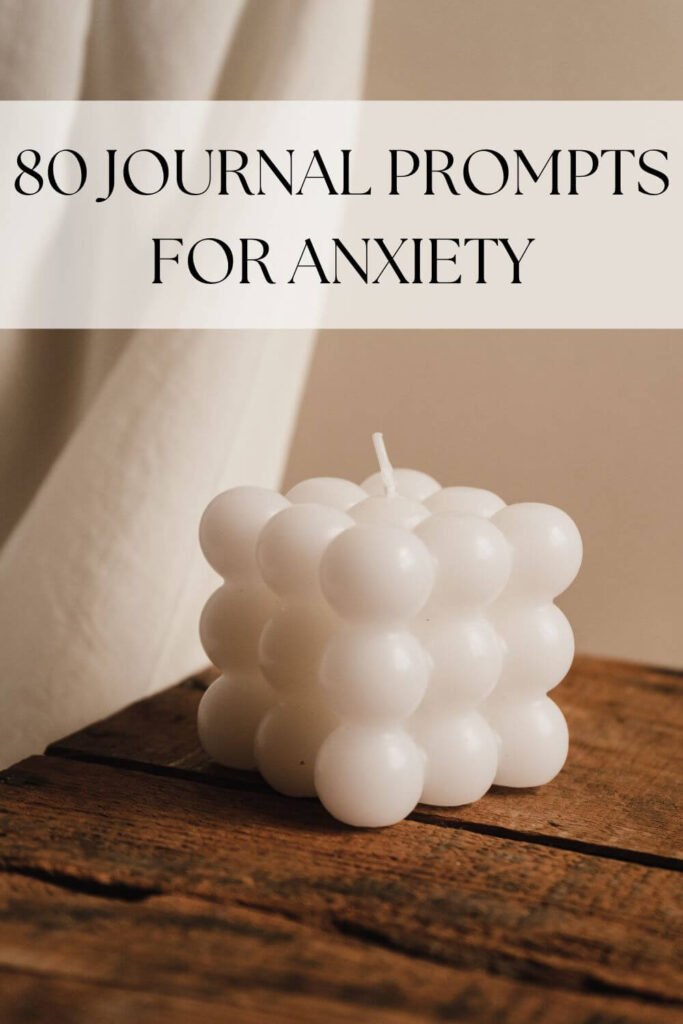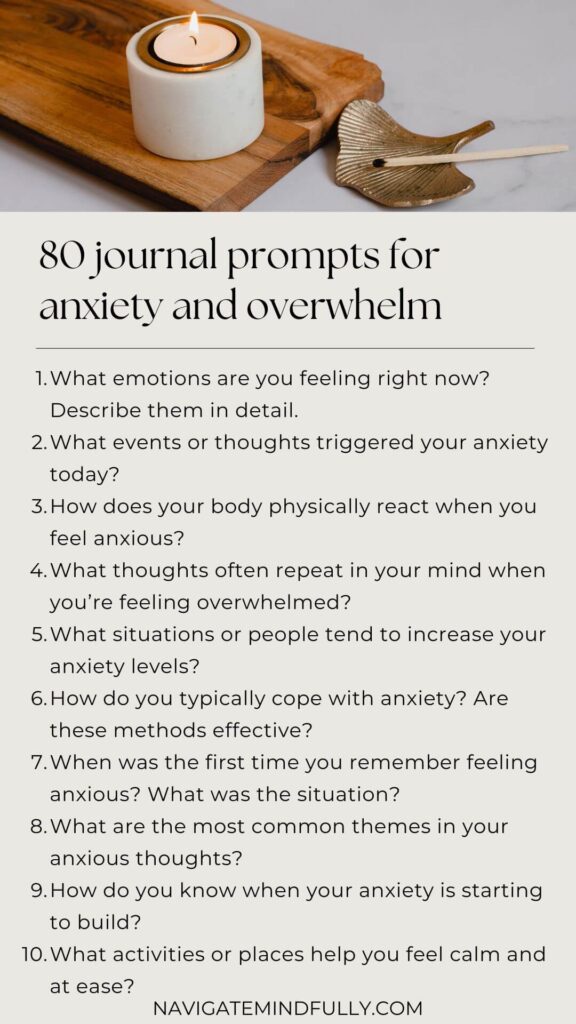80 Journal Prompts for Anxiety and Stress
Discover insightful journal prompts for anxiety that will make a difference in dealing with stress and overwhelm.
With how fast-paced life is these days, anxiety has become all too normal. Whether it’s the stress of daily responsibilities, the pressure of future uncertainties, or the weight of past experiences, anxiety can feel overwhelming and suffocating.
Journaling is a gentle but effective way to work through these strong feelings. Writing gives you a safe place to explore your thoughts, figure out how you feel, and let go of the stress.
Experiencing Anxiety
Anxiety can be experienced in many ways, from a constant feeling of worry to sudden spikes of fear. It’s important to know that everyone experiences anxiety differently, and what may trigger anxiety for one person might not affect another in the same way.
Anxiety can cause physical symptoms such as rapid heartbeat, sweating, trembling, and shortness of breath, while the emotional and mental toll may lead to feelings of unease, difficulty concentrating, and racing thoughts.
Figuring out how your anxiety shows up is the first thing that you need to do to successfully deal with it.

80 Journal Prompts for Anxiety and Overwhelm
Explore guided journal prompts for self-reflection, emotional release, grounding, and self-compassion to deal with anxiety, stress, and overwhelm.
Self-Reflection and Awareness
- What emotions are you feeling right now? Describe them in detail.
- What events or thoughts triggered your anxiety today?
- How does your body physically react when you feel anxious?
- What thoughts often repeat in your mind when you’re feeling overwhelmed?
- What situations or people tend to increase your anxiety levels?
- How do you typically cope with anxiety? Are these methods effective?
- When was the first time you remember feeling anxious? What was the situation?
- What are the most common themes in your anxious thoughts?
- How do you know when your anxiety is starting to build?
- What activities or places help you feel calm and at ease?
- How do you talk to yourself when you’re feeling anxious? Is it compassionate or critical?
- What does a typical anxious day look like for you? Describe it in detail.
- How does anxiety affect your relationships with others?
- What role does perfectionism play in your anxiety?
- How do you feel after an anxiety episode has passed?
- What are your biggest fears, and how realistic are they?
- How does your anxiety influence your daily decisions and actions?
- What do you avoid because of your anxiety?
- What would you tell a friend who is experiencing the same anxiety you feel?
- What small steps can you take today to better understand and manage your anxiety?
Emotional Release
- What is the biggest worry on your mind right now? Write it out in detail.
- Describe a recent situation that made you feel extremely anxious.
- Write a letter to your anxiety, expressing your feelings towards it.
- What are three things you are grateful for today, despite feeling anxious?
- When was the last time you felt a sense of relief from your anxiety? Describe the experience.
- What is something you wish you could say out loud but feel too afraid to?
- List all the things that are currently causing you stress. How do they impact you?
- Write about a time when you felt overwhelmed but managed to get through it.
- How do you feel after you’ve had a good cry? Describe the physical and emotional sensations.
- What are some healthy ways you can release your emotions when you’re feeling overwhelmed?
- What would you scream out loud if no one could hear you?
- Write about a moment when you felt truly at peace. What were you doing, and how did it feel?
- How does holding onto negative emotions affect your body and mind?
- What are the words you need to hear most right now? Write them down and reflect on them.
- Describe a time when someone helped you through a period of anxiety or overwhelm.
- Write about your ideal support system. Who are they, and how do they help you?
- How does your environment affect your ability to release emotions?
- What music or art helps you process and release your emotions? Describe how it makes you feel.
- Write a poem or short story that captures your current emotional state.
- What advice would you give to someone else who is struggling with anxiety and needs to release their emotions?

Mindfulness and Grounding
- Describe your surroundings right now. What do you see, hear, smell, and feel?
- Write about a recent moment when you felt fully present. What were you doing, and how did it feel?
- How can you incorporate more mindfulness into your daily routine?
- What are five things you can see, four things you can touch, three things you can hear, two things you can smell, and one thing you can taste right now?
- Describe a time when focusing on your breath helped calm you down. What did you notice?
- What are some grounding activities that make you feel connected to the present moment?
- Write about your favorite place to practice mindfulness. Why do you choose this place?
- How does being mindful affect your experience of anxiety and overwhelm?
- Describe a mindful eating experience. How did it differ from your usual eating habits?
- What sensations do you notice in your body right now? How do they change as you focus on them?
- How does nature influence your ability to stay grounded and present?
- Write about a daily activity you can turn into a mindfulness practice. How will you do it?
- What thoughts come up when you sit quietly for a few minutes? How do they change over time?
- How can you use mindfulness to navigate a challenging situation in your life?
- Describe the feeling of your feet on the ground. What do you notice when you pay attention to this?
- How does practicing gratitude help you stay present and grounded?
- Write about a grounding exercise that you find particularly helpful. Why does it work for you?
- How do you remind yourself to return to the present moment throughout the day?
- What role does mindfulness play in your self-care routine?
- Reflect on a mindfulness or grounding technique you’ve recently learned. How has it impacted your anxiety levels?
Self-Compassion and Positive Affirmations
- What are three positive affirmations you can say to yourself when you feel anxious?
- Write a letter of compassion to yourself. What do you need to hear right now?
- What are your strengths and how do they help you cope with anxiety?
- Describe a time when you successfully managed a stressful situation. What positive qualities did you use?
- How can you show yourself kindness today?
- What are three things you love about yourself?
- Write about a difficult experience and how you showed resilience. What affirmations can you derive from this?
- How would you comfort a friend who is feeling the way you do now? Apply this advice to yourself.
- What are some self-compassionate phrases you can use during moments of anxiety?
- List five qualities you admire in yourself and explain why.
- What does self-compassion mean to you, and how can you practice it more often?
- Write about a recent accomplishment, no matter how small. How can you celebrate this achievement?
- How can you reframe a negative thought into a positive affirmation?
- What are some things you can forgive yourself for? Write a forgiveness letter to yourself.
- Describe a self-care activity that makes you feel loved and nurtured. How can you incorporate it into your routine?
- What are some kind words or phrases you can repeat to yourself when you’re feeling overwhelmed?
- How can you practice gratitude towards yourself and your efforts?
- Write about a quality you wish to develop and how you can affirm this growth in your daily life.
- What makes you feel proud of yourself? Reflect on these moments and affirm your worth.
- How can you create a daily ritual of positive affirmations to support your mental well-being?
Pin these anxiety journal prompts for later!
Journaling for Anxiety
Journaling for anxiety and overwhelm is a great way to improve your mental and emotional health. Journal prompts for anxiety allow you to reflect, release, and reconnect with your inner self.
Journaling is a form of self-care that can give you new insights and perspectives and help you deal with all the stress and negative emotions.
As you explore these anxiety journal prompts, try to be gentle and kind to yourself, because how you treat yourself, matters the most.








